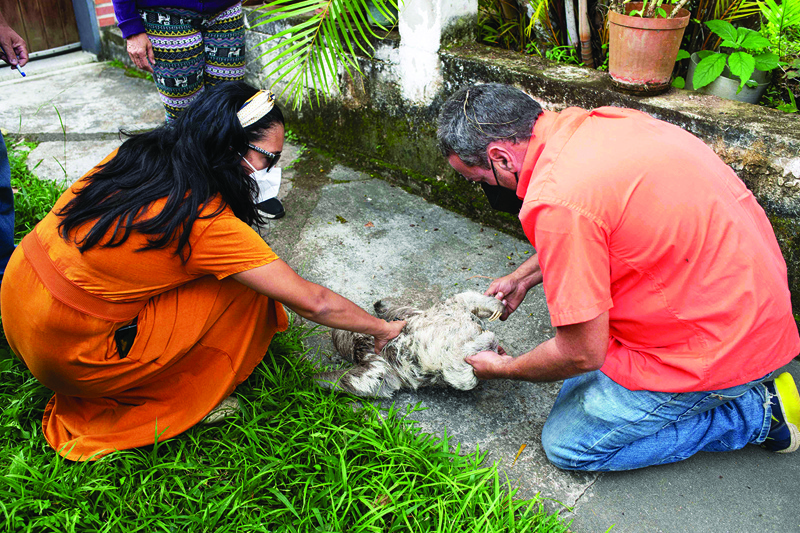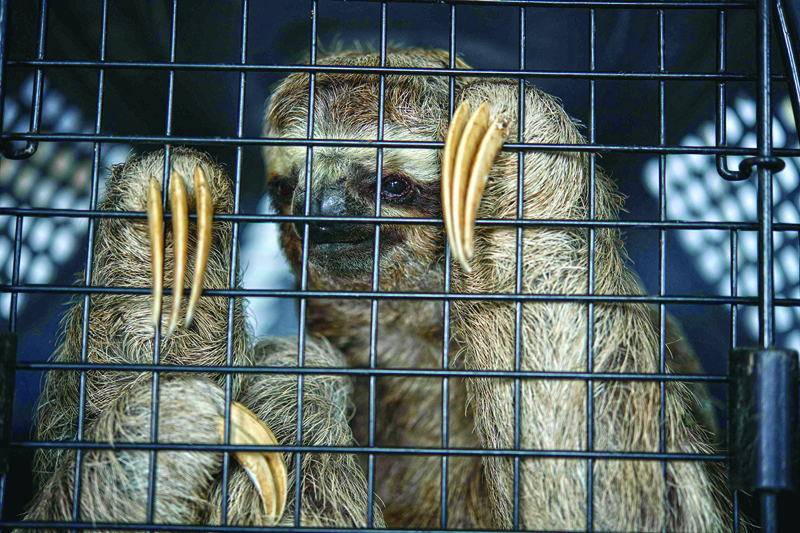 Juan Carlos Rodriguez and his wife Haydee, founders of Chuwie's Sloth Rescue Center, check a sloth (Bradypus tridactylus) after being rescued from palm trees where it took refuge in an urban area after being attacked by dogs in San Jose de Los Altos, Miranda state, Venezuela on Sept 23, 2021 . - AFP photos
Juan Carlos Rodriguez and his wife Haydee, founders of Chuwie's Sloth Rescue Center, check a sloth (Bradypus tridactylus) after being rescued from palm trees where it took refuge in an urban area after being attacked by dogs in San Jose de Los Altos, Miranda state, Venezuela on Sept 23, 2021 . - AFP photosHaydee Rodriguez has just set free a sloth named Maruja 58 in a forested area outside Caracas and is watching her get settled. "Look how pretty! It's dancing in the trees," said Rodriguez, who along with her husband Juan Carlos shares a passion for the lethargic mammals that spend a lot of time hanging upside down from treetops. Maruja 58 is the 58th sloth the couple has rescued, cared for and freed through the Chuwie Foundation, the organization they founded that works to help these animals native to the rainforests of Central and South America.
Chuwie was the first sloth they rescued, and his face provides the logo of the foundation, located in San Antonio de los Altos, a suburb of Venezuela's capital. "We also want to help with research. To know how many sloths there are, for instance, and how they live," said Juan Carlos Rodriguez. There are no official figures for the sloth population in Venezuela, but deforestation in Latin America has reduced the size of the animals' habitat, says the World Wildlife Fund (WWF).
 A sloth rests inside a cage while remaining in recovery at Chuwie's Sloth Rescue Center to later be released into its natural habitat.
A sloth rests inside a cage while remaining in recovery at Chuwie's Sloth Rescue Center to later be released into its natural habitat.The International Union for Conservation of Nature says the pygmy three-toed sloth is in danger of extinction, and another species - the maned three-toed sloth - is considered "vulnerable". Near Caracas, the sloths face three main threats: Dogs that attack them, getting hit by cars and, above all, high voltage wires that run through forested areas. The sloths try to cling to them and are electrocuted.
That is what happened to Chuwie. He lost part of his left arm and suffered severe burns. The Rodriguez family, who had turned the injured animal over to a vet, adopted him. To raise awareness of the story, Haydee, who works in the news media, and Juan Carlos, a graphic designer, created a social media account - @Chuwieelgalan - that now has almost 10,000 followers on Instagram.
They learned from environmental specialists in Costa Rica how to care for these animals, and in just a few months, the Rodriguez family started going out to help injured ones. "Without even trying, we became sloth rescuers," said Haydee. She and Juan Carlos have kept their day jobs, but the sloths now take up most of their time. They currently have six sloths with them at home recovering so they can be released. One was severely bitten by dogs, a baby one was found without its mother and another suffered a shock from a high voltage cable. The couple wants to build a bigger facility to shelter more animals.
'Curse of the eternal smile'
Juan Carlos goes out every day to find fresh leaves from specific trees to feed the sloths he is hosting, and says he needs 1.6 kg of them. To pay for all of this, Haydee Rodriguez developed and now sells things with Chuwie's face on them, such as caps, coffee mugs, T-shirts and earrings. "People are really moved by Chuwie. He is a survivor," says Juan Carlos, "but we will never be able to release him." The animal is severely disabled now.
On their website, the couple carefully avoids posting photos of them with Chuwie in their arms. "They are not pets or stuffed animals," said Juan Carlos. "Sloths have the curse of the eternal smile. Even when they are in agony, it looks like they are smiling," he said, adding that people who want to domesticate them are one of the dangers facing these creatures.
When a telephone rings out of the blue, they learn there is a sloth in jeopardy. Juan Carlos and Haydee jump into their car and race to a nearby neighborhood. A sloth is hanging from high up in a palm tree after fleeing from a dog that bit it on the leg, explains the dog owner, Maria Antonia Mugica. "It went up and up, and has been there since yesterday," said Mugica. "I called so it can be rescued."
Juan Carlos manages to bring the sloth down. The animal is fine, but they must move it away from the residential area. A few kilometers away, the couple sees an area with no high voltage wires and with the kind of trees that sloths like. They free this newly assisted one. Her name is Maruja 58. - AFP










